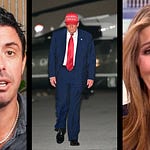NO CONGRESSIONAL DEMOCRAT has been as willing to accept and oblige Elon Musk in his MAGA turn as Rep. Ro Khanna.
The Californian, whose district includes Silicon Valley, has encouraged his fellow party members not to decamp from Musk’s platform, X. He’s praised Musk as a disruptive force for good in the electric vehicle and space industries. And he’s spoken about his desire to work collaboratively with Musk’s “Department of Government Efficiency” as it looks to slash $2 trillion from government expenditures.
But even Khanna has qualms about the world’s richest man making a febrile foray into national politics. In an interview with The Bulwark, Khanna called for Musk and his DOGE co-chief, Vivek Ramaswamy, to ensure that the public was aware of conflict of interests in their work by disclosing their finances. Musk, for one, has numerous federal contracts tied to various companies, among them SpaceX and Starlink.
“I think there should be transparency. I think he would have to do the same financial disclosures that I have to do, that the presidents need to do. I think there should be complete transparency in those interests and he should recuse himself if there is a conflict of interest,” Khanna said. “I just assumed that they would put them through a financial disclosure process and conflict-of-interest process. I mean, absolutely that. That to me strikes me as a very reasonable request.”
Musk has not released comprehensive information on his finances, while Ramaswamy did put out tax information as part of his Republican presidential primary run. A spokesperson for “DOGE” declined to comment.
Good-government groups, ethicists, and even fellow entrepreneurs have warned that DOGE creates a morass of conflicts. And while Musk has promised that the still-inchoate, quasi-governmental cost cutters will post “all actions” online, the Trump transition team has only said the entity will be “compliant with all legal guidelines related to conflicts of interest.” But it is not yet clear if DOGE will be structured as a government body that would require them to comply with such guidelines—or as some sort of non-profit, outside consultant group exempt from them.
While the potential for corruption has troubled Democrats, their primary concern is what DOGE will do to actual governance. Musk has hinted at targeting a host of different agencies and expenditures, from outdated IT to full elimination of the Consumer Financial Protection Bureau and the National Institutes of Health. The debate within the party is over whether to try and shape the cuts and reforms that DOGE proposes or to dismiss it entirely. In a separate interview, Rep. Brendan Boyle (D-Pa.) called the entity “a complete joke,” that, in reality, had the power of two rich men with a joint Twitter account.
“There is no Department of Government Efficiency. Just tweeting out that you are creating a department is not the way it works,” Boyle said.
Khanna disagrees. He was “not confident” that DOGE wouldn’t end up suggesting reforms or cuts to major entitlement programs like Social Security and Medicare. But it was precisely for that reason, he argued, that Democrats should be at the table, fighting to protect fundamental interests.
“We have to be willing to cross party lines to put the American people first, being vigilant, understanding that there are going to be places to oppose, and understanding that there’s some risk,” he explained. “But what’s the alternative? That we just all retreat to our camps and never be willing to cross the aisle to look for common ground?”
Khanna ultimately did not have a nihilistic view of what DOGE might do, arguing that Congress would have final say on pay cuts and that legal challenges would likely derail any dramatic efforts by the Trump administration to rescind federal expenditures or dramatically fire career officials.
But he was less sanguine about his party’s ability to navigate rocky political waters.
Democrats, after all, used to embrace the tech entrepreneurial class. And Musk, in turn, once identified as a Democrat. Philosophical differences may have intervened—most notably when Joe Biden excluded Tesla from an electric vehicle summit because the company opposed both the president’s Build Back Better initiative and unionization efforts at its plants. But Khanna said he believed the current fissures could have been avoided.
“What I would have done is of course I would have invited him to the summit and I would have sat him next down to UAW probably, to [the union’s president] Sean Fain,” said Khanna. “And you know, Elon would have probably found that funny, but I would have said, ‘Elon, you know, when are we going to get Sean Fain to unionize?’ I mean, my point is: Don’t exclude, challenge, that’s leadership. And so now maybe we would have still lost him, at least you’re being honest about your perspective.”











